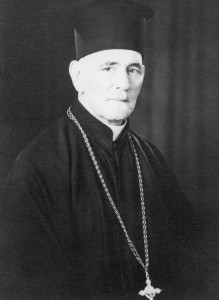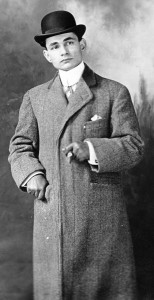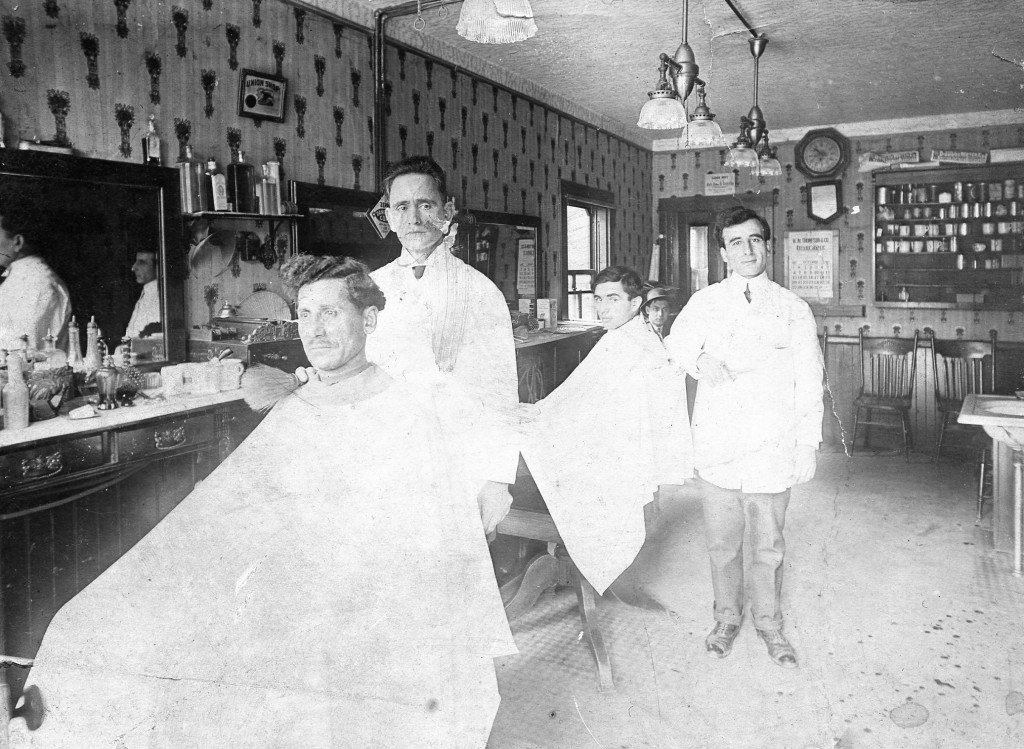Erie, Pennsylvania (AP). “The Reverend Demosthenes Chiamardas, 93, reportedly the first Greek Orthodox clergyman to be ordained in the United States, who came to this country in 1905, from his native Greece, died Thursday.”
On June 6, 1957, this one-sentence obituary from the Associated Press appeared in newspapers around the country and around the world. During his long life, Fr. Chiamardas served as priest in twenty parishes in seven states. He was the founding priest of one parish and contributed to the establishment of three others. Despite these accomplishments and his special place in the history of Greek Orthodoxy in the United States, he is little known outside Erie, Pennsylvania, where he served for fourteen years as priest of the Assumption Greek Orthodox Church, and where he spent the last thirty years of his life.
Nothing about the life and career of Fr. Chiamardas was ordinary. His background was unusual, giving no indication that he would become a priest. No one else in his family had taken that vocation. He had neither seminary training nor any formal education. He married late, waiting until he was nearly 40, and then fathered eight children. He came to the United States in middle age and did not begin his 33-year career as a priest until he was 53. In order to introduce this remarkable man to a wider audience, I will focus on his life story in this and several subsequent contributions to this web site.
The life and career of Fr. Chiamardas is documented in a journal written by his nephew, Demetrios (James V.) Chiamardas (1888-1960). It tells the story of his uncle’s large family, detailing the consequences of choosing a priestly career with frequent travel, long absences, periodic moves, and periods of unemployment. James maintained the journal over many years, recording events as they occurred, and providing a source of information that has proven to be reliable. It is a major contribution to our understanding of the struggles encountered by early Orthodox priests in North America, shedding light on seldom-seen corners of a priestly life. The journal, a wealth of other documentation, and many vintage photographs have been lovingly preserved by the family and are now in the possession of Fr. Chiamardas’s grandsons, Jim Chiamardas of Erie, Pennsylvania, and Charles Chiamardas of West Palm Beach, Florida.
James Chiamardas was not merely his uncle’s Boswell; he also had a special relationship with his uncle’s family. James lost his mother when he was only three. After his father died a few years later, in 1897, James was taken in by his uncle and raised as his own. He would live with his uncle’s family for the remaining sixty-three years of his life. When James came of age, he followed his uncle and became a barber, working with him in Greece and America. Later he held positions as chanter, sexton, choir organizer, parish council secretary, and other supporting roles in the parishes where his uncle served. He also acted as surrogate father to his uncle’s children during the times when their father was away serving parishes around the country.
Demosthenes Chiamardas was born in 1864 in Delihanasi, a small village near the town of Megalopolis, Arcadia, in the central Peloponnesus peninsula of Greece. He was one of six children born to Ioannis and Chrysi Tsiamardas. Demosthenes was an autodidact, who learned to read and write from friends who were schoolteachers. He is said to have learned Byzantine music and chant from the priest at a local church. He served twice in the Greek army, fighting against the Turks in the wars of 1886 and 1897. As a young adult he moved to the town of Gargalianoi in the southwest corner of the Peloponnesus peninsula, where he would work as a barber.
Demosthenes did not marry until November 1903 when he was 39 years old. Most of his siblings had died young, and it appears that he was the financial support for his family. In 1903, he married Calliope Protopapa from Pylos, a town south of Gargalianoi. In her family, there was a tradition of the priesthood: her paternal grandfather and two of her brothers were priests.
In October 1905, less than two years after his wedding, Demosthenes sailed for America. Emigration was a bold step for the 41-year-old barber, and it is unclear what motivated him. Perhaps the reason was financial. He was from one of the poorer areas of Greece. Early on, there were many Greeks from this area who immigrated to North America. Of course he needed to provide for his growing family. He and his wife had twin boys, and his wife was expecting another child as he prepared to leave. Sadly, one of the twins died shortly before his departure.
Demosthenes was the first of his extended family to come to the United States. His destination was the home of a friend in Woburn, Massachusetts, a town north of Boston. He did not stay long, soon moving to Boston where he worked long hours in a barbershop for only $7 a week. He also served as chanter at the Greek Orthodox Cathedral of the Annunciation in Boston. In 1906, his fortunes improved when he moved to Brockton, Massachusetts, a small city south of Boston. The thriving shoe industry there had attracted a sizeable community of Greek immigrants. He found work in a union barbershop on the main street for $14 a week. After settling in Brockton, Demosthenes was joined by his nephew James, who arrived in New York in the summer of 1907.
By 1909, Demosthenes had saved enough money to bring his family to the United States. In October he returned to Greece and was reunited with his wife. Four of their first six years of married life had been spent apart, and much had changed. After his departure, their remaining twin son had died, and son Ioannis (John) had been born. Demosthenes spent two months in Greece, and then set out with Calliope, their three-year-old son Ioannis, and their 12-year-old nephew Panagiotis for New York. They crossed the North Atlantic in the middle of winter, when the seas are usually rough. Their stay in the United States would, however be brief. Panagiotis was diagnosed with trachoma, an infectious eye disease. After three days in the Ellis Island Hospital, they were all deported, returning to Greece in January 1910. Four months later, the Chiamardas family tried again. Calliope was by this time pregnant with their fourth child. Her older brother Demetrios accompanied them this time. The Chiamardas party of four was successful this time, being admitted to the United States on June 1, 1910. They immediately set out for Brockton, where they were reunited with nephew James, who had maintained the family residence and worked at the barber shop during his uncle’s absence.
This was the end of the first leg of their journey. Much more travel and many more adventures – and struggles – awaited Demosthenes Chiamardas and his family in the years ahead. During an eight-month period in 1909-1910, he had crossed the Atlantic four times to bring his family to their new home. He would never again step foot on Greek soil, spending the last 52 years of his life in America.
This article was written by William H. Samonides, Ph.D.



I would like to comment on the author of this article. The painstaking time and effort spent by William Samonides, Ph.D in researching and verifying the information contained in this article was amazing. As time goes on I believe that William will take us on a valuable journey to better understand and learn about the early Greek Orthodox priests and parishes in the United States.